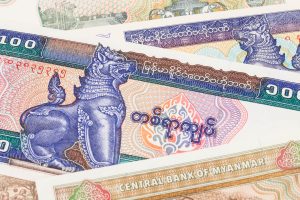Military-ruled Myanmar could soon join North Korea and Iran on a key international financial blacklist, dealing a blow to the military junta’s hopes of stabilizing the country’s economy. Nikkei Asia, citing four Western and Asian government officials familiar with the matter, reported yesterday that the Financial Action Task Force (FATF) is expected to approve Myanmar’s addition to its “call to action” blacklist next month.
FATF, an intergovernmental body established in 1989, describes itself as a “global money laundering and terrorist financing watchdog,” which helps to coordinate international efforts “to prevent organized crime, corruption, and terrorism.” As such, it is no surprise that it is turning its eye to Myanmar, which even prior to last February’s coup, was awash with dirty money.
One Asian diplomat told Nikkei that FATF’s international cooperation review group, which oversees the process and is set to meet in Paris in October, will likely recommend that Myanmar be blacklisted because of the country’s “unsatisfactory progress” in tackling organized crime and money laundering. The diplomat said that if there were to be a majority in favor of adding Myanmar to the blacklist, then Singapore, which currently holds the FATF presidency, would not stand in the way.
“The lack of progress shown by the junta means the plenary would find it difficult to justify not moving Myanmar to blacklist,” the diplomat told the publication.
The FATF blacklist, officially referred to as a “call for action,” currently only contains two nations: North Korea and Iran. A further 21 nations, including Myanmar, are currently on the FATF’s grey-list of “monitored jurisdictions.”
As this sorry company suggests, an addition to the blacklist would deal a significant blow to the military junta. It would place Myanmar banks and financial entities outside the mainstream of the international financial system, requiring firms dealing with them to fulfill burdensome and exhaustive reporting requirements. While it would not cut the country off totally, it would drastically narrow the range of foreign entities that would see profit in doing business in Myanmar, let alone investing there.
Since the military coup of February 2021, Myanmar’s descent into political turmoil has been paralleled by a stunning economic collapse. In July, Fitch Solutions, a division of Fitch Group, projected that Myanmar’s economy would contract by 5.5 percent in the financial year to September, after shrinking by nearly 18 percent the year prior. Meanwhile, foreign investors have rushed for the exits, and the kyat currency has gone into free-fall, increasing the cost of living pressures on those lucky enough to be untouched by the intensifying conflict.
Ominously, Fitch stated that economic conditions will remain extremely challenging in Myanmar” and said that it did not expect “economic output lost during the pandemic to be recouped until at least FY28.”
The military junta has appeared unconcerned about the flight of foreign capital. Indeed, many of its actions, such as the recent arrest of former U.K. ambassador Vicky Bowman, who ran a business advisory aimed at helping foreign companies pursue ethical business opportunities in Myanmar, seem to communicate a contempt and indifference to foreign, particularly Western, opinion.
A FATF blacklisting would deepen Myanmar’s downward economic tailspin, and force the military onto a deeper reliance on a narrower spectrum of foreign entities – including, most likely, many from neighboring China and fellow global pariah Russia. As with economic sanctions, it remains unclear whether the main impacts would be borne overwhelmingly by the military brass, or by the long-suffering Myanmar public. Either way, the path out of the current quagmire is likely to be long, turbulent, or both.

































